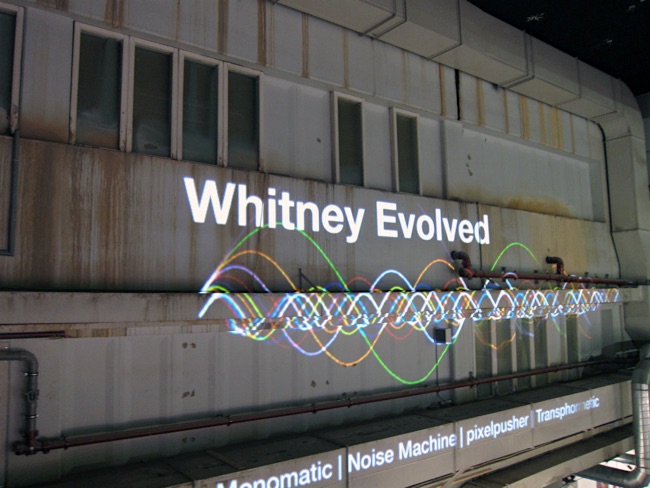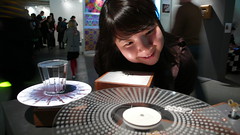Whitney Evolved

Real-time, code-based audiovisual works inspired by, interpreting and extending John Whitney Sr.’s animated films
9-12th February, 2012 – Kinetica Art Fair
P3, 35 Marylebone Road, London NW1 5LS
John Whitney Sr. is considered by many to be the godfather of modern motion graphics.
“Beginning in the 1960s, he created a series of extraordinary films of abstract animation that used computers to create a harmony – not of colour, space, or musical intervals, but of motion” (Alves, 2005:46). He championed an approach in which animation wasn’t a direct representation of music, but instead expressed a “complementarity” – a visual equivalence to the attractive and repulsive forces of consonant/dissonant patterns found within music. Whitney recognised that his work represented the infancy of an art form, but suggested that, “Composers will discover a congruence of aural-visual partnership… grounded on valid harmonic interrelationships equally applicable to sound and image” (Whitney, 1980:18).
Monomatic (Nick Rothwell & Lewis Sykes) with Noise Machine (Mick Grierson), pixelpusher (Evan Raskob) with computational design students from Ravensbourne and Transphormetic (Paul Prudence) presented a series of real-time, code-based audiovisual works inspired by, interpreting and extending Whitney’s animated films – projected at large scale onto the rear wall of the P3 exhibition space throughout KAF ’12.
Building on John Whitney’s aesthetic of simple dot and line, bold colour and dynamic geometric form they re-imagined his two-dimensional patterns in new forms: three-dimensional shapes and projection-mapped patterns. Some also took the next step of creating sound and music to correspond directly to those visual images – something John Whitney Sr. himself never managed to realise.
Monomatic: www.monomatic.net
Noise Machine: www.mickgrierson.co.uk
pixelpusher: pixelist.info
Ravensbourne www.rave.ac.uk
Transphormetic: www.transphormetic.com
References:
Alves, B. (2005) ‘Digital Harmony of Sound and Light.’ Computer Music Journal, 29(4) pp. 45-54.
Whitney, J. (1980) Digital Harmony: On the Complementarity of Music and Visual Art. Peterborough, N.H.: McGraw-Hill
